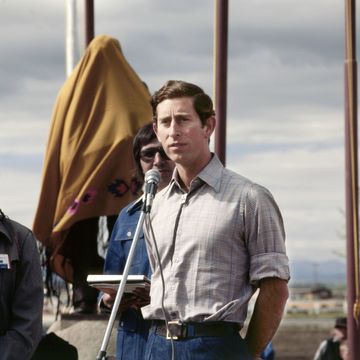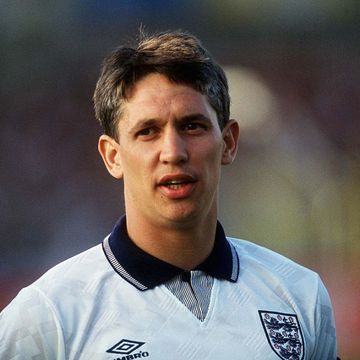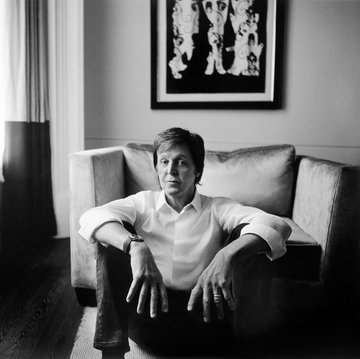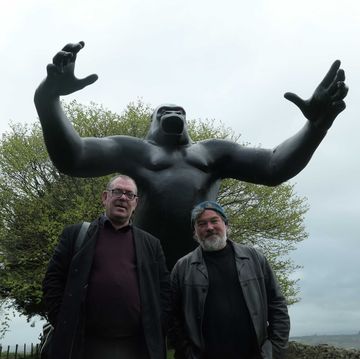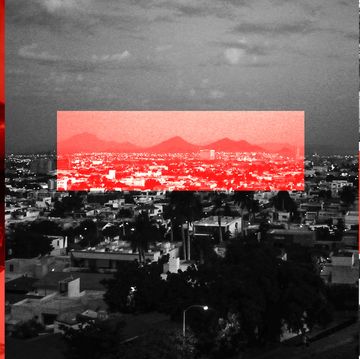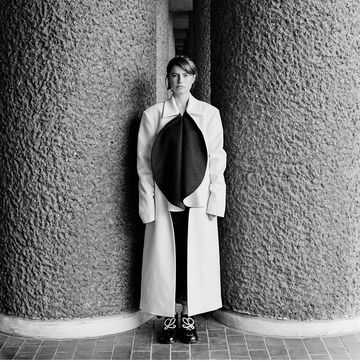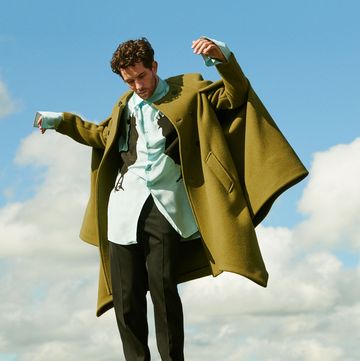Rufus Norris had not long taken on the biggest job in British theatre, three years ago, when a draft for Network landed with a thud on his desk. (Never mind that the script was probably sent by email and that, as the artistic director of the National Theatre, Norris might not even have an actual desk; that's just how these stories start.) The writer was Lee Hall, best known for his screenplay of Billy Elliot. Norris liked it, liked it a lot, in fact. It felt classic but also somehow modern: its mood tapped into something — our age of rage, if you like — that was in the ether now. It was, he felt, exactly the kind of play the National should be doing.
Norris approached Ivo van Hove, a 58-year-old Belgian who is the wildest and weirdest, most brilliant and scandalous auteur at work in theatre today, about directing it. "Rufus said, 'We have a draft of something, Network it's called, do you know it?'" recalls van Hove. "And I said, 'Yes, of course I know it, because I'm that old.'" Network started out as a movie; it dominated the 1976 Academy Awards, winning three of the four acting categories.
Did van Hove like it as a young man? "I still remember it, so that's the good thing," he smiles. "There's a lot of movies where I think, 'What was that exactly?' This one is part of my memory."
The film, once seen, is not easily forgotten. Network was intended as a nihilistic satire on the direction that television, and specifically news coverage, was headed in the Seventies. At its heart is Howard Beale, an anchorman who is plunged into despair when his ratings drop and he is fired. He turns suicidal and threatens to kill himself live on air at an appointed time. Bizarrely, this announcement leads to a dramatic resurgence in popularity. Beale is reborn as "the mad prophet of the airwaves", a man who channels the anger of the common man.
Network was written by a furious Paddy Chayefsky, a New Yorker who lived through the Great Depression, sat on a landmine in World War II and yet who still saved his greatest apoplexy for the world of broadcasting. His incendiary screenplay, which also earned him an Oscar, is full of tub-thumbing speeches, and Lee Hall and van Hove decided early on that they would not touch much of it. At one point in the film, a rabid Beale, played by the British actor Peter Finch, fumes, "If there's anybody out there who can look around this demented slaughterhouse of a world we live in and tell me that man is a noble creature — believe me, that man is full of bullshit." Which, I don't know about you, is how I feel most days. This leads on to his most famous rant, now number 19 in the American Film Institute's list of greatest movie quotes. Staring down the barrel, Beale encourages his viewers to go to the nearest window and scream, "I'm as mad as hell, and I'm not going to take this anymore!"
Finch was only able to do one take of the "mad as hell" speech, stopping midway through the second because it left him so exhausted. He died during promotion of the film, aged 60, before he could even receive his Academy Award for Best Actor. Van Hove's first task was to find a new Howard Beale and he settled quickly on Breaking Bad's Bryan Cranston. "That was immediately clear that he was the perfect man," says van Hove. "I think I can perhaps totally misdirect the whole thing, but Bryan cannot do anything wrong. It feels that it's so natural to him. To relate to this man who stands against the machine and who wins and then doesn't win at all. We made this little trailer for Network in New York and I said to him that his face, he looked like all anchormen, from all over the world. From Walter Cronkite to today. So Bryan has this perfect look."
And this is not just a Hollywood star doing a few weeks in the theatre to prove they have acting chops. Van Hove points out that Cranston won a Tony Award in 2014 for his portrayal of former US president Lyndon Johnson in All the Way. "Everybody thinks he's a movie actor, but he comes from the theatre," he says. "It's not like Tom Cruise, eh? No, but that's a difference — not better or worse but it's different."
In the 40-plus years since Network, the film has been credited with predicting reality TV, the ISIS propaganda videos (there is a subplot about a terrorist cell) and the rise of Donald Trump. This prescience creates its own problems for staging a theatre production in 2017. When it opened, the film poster called Network "perfectly outrageous". Regrettably these days mad prophets telling us how we should feel are everywhere, especially on American television. The notion of a suicide live on air was not even far-fetched when Network was first released: Christine Chubbuck, a 29-year-old reporter for a Florida television station, put a gun to her head and pulled the trigger in the middle of a live broadcast in July 1974. Latterly, news reporter Alison Parker and photojournalist Adam Ward, employees of a CBS affiliate WDBJ, were shot by a former colleague while doing an interview in August 2015.
For van Hove, who has chosen not to rewatch the original movie, Network can no longer be considered a satire. Events have overtaken it. "In the Seventies, it was a futuristic thing," says van Hove. "It was also a little bit over the top. That's the difference now, but also the interesting thing. The futuristic satirical nightmare became a real nightmare. We're in the middle of it every day."
Network certainly remains a powerful human tragedy and a precise skewering of the soporific power of television. Stephen Colbert, the comedian who presents The Late Show in the US, cites it as his favourite film. The creator of The West Wing, Aaron Sorkin, compares Paddy Chayefsky to George Orwell in his uncanny ability to predict the future. "If you put [Network] in your DVD player today you'll feel like it was written last week," Sorkin tells Dave Itzkoff in the book Mad as Hell: the Making of Network and the Fateful Vision of the Angriest Man in Movies. "The commoditisation of the news and the devaluing of the truth are just a part of our way of life now. You wish Chayefsky could come back to life long enough to write The Internet."
"Chayefsky was really a kind of visionary," van Hove agrees. "But Network is also a Greek tragedy. It's a man who becomes a scapegoat because his ratings are not good anymore. They dump him but he has this last show and becomes a great success. So this scapegoat becomes the hero and then you see the hero's downfall. More Greek it doesn't get!"
Perhaps the most extraordinary thing about Network in 2017 is not its thematic foresight, or the calibre of the crew and cast behind it, but the form it will take: of all things, a play. In an age when we can consume whatever we want, whenever we want and however we want, a form as fleeting and ephemeral as theatre seems like an anachronism. And yet.
A few Saturdays ago, I went to see The Ferryman in London's West End. As plays go, it is the hot ticket right now: when the box office opened last November the initial run sold out in a day, a record. The production had transferred from the intimate Royal Court to the grander Gielgud Theatre, and our seats were bought months in advance. That Saturday night there was an unmistakable buzz and mild giddiness: none of those present — "Hey Sadiq Khan, good job! Hiya Wes Anderson, nice suit!" — would rather be anywhere else. The Ferryman boasts a formidable roll call of talent: Sam Mendes directs, and Paddy Considine takes the lead. But in theatre, at least in Britain, the home of Shakespeare, the "primary artist" is still the writer, and the draw for many was that this was the first play by Jez Butterworth since his 2009 smash Jerusalem.
After three hours and 20 minutes of dancing, fighting and a lot of drinking in early-Eighties, Troubles-era Northern Ireland, followed by three encores, the audience of nearly 1,000 poured out onto the streets of Soho again. We mingled with a similar number of people who had just left the Apollo Theatre next door where Sienna Miller stars in Cat on a Hot Tin Roof, and the masses from Harry Potter and the Cursed Child down the road. There was a certain smugness in the throng: all of us had experienced an unrepeatable, one-of-a-kind evening. If we were the type to brag on social media, now would be an excellent opportunity. Although, since 2009, the National Theatre has broadcast select stage productions to cinemas in their NT Live initiative, tonight's performances would exist only in the memories of the people who had witnessed them. No streams, DVDs or YouTube clips would be available. Which is quite something when you stop and think about it.
Theatre is having a moment, in London and other places besides. Its revitalisation goes against the grain of our modern box set-and-podcast times: mostly we are very happy to enjoy entertainment at home, and we don't really care if we consume it at the same time as other people. This is the age of Netflix and binge watching. "The entire family no longer gathers around the television set, and the watercooler moment has vanished," noted Kevin Spacey, not sadly, in his 2013 James MacTaggart Memorial Lecture at the Edinburgh International Television Festival.
Yet, theatre defies these trends: in 2016, West End playhouses were the busiest they had been since box-office figures started being recorded in 1986. More than three-quarters of available seats were filled last year, an increase of 4.1 per cent on 2015. Perhaps surprisingly, there has been a vertiginous spike in young people attending the theatre. The National Theatre has seen ticket sales increase by 75 per cent in under-35s. The average age of their audiences has dropped from 55 to 51, which doesn't sound that dramatic, but across 900,000 tickets sold each year represents a significant shift. In October, Nicholas Hytner, the predecessor of Rufus Norris as director of the National, opened The Bridge, London's first new large-scale commercial theatre in 80 years.
"We are increasingly told that it's all about us, it's all about the self, social media, mobile phones," says Norris, an acclaimed director in his own right. "You can almost live your entire existence without having to come into contact with another person face to face. But that isn't ultimately what human beings are about. If you go to the seaside you'll notice that most humans are on the same beach, or they'll go to pubs or to clubs. People do like being with other people, we're inherently sociable. There's something joyful about laughing or being moved in a group."
That's one reason; another is that theatre has adapted to the times. Productions have become innovative and surprising, and that doesn't just mean doing Shakespeare in jeans and T-shirts. What has historically often been a dry, worthy evening of entertainment has become anything but predictable. And theatre's run certainly doesn't show any signs of stalling. Network opens at the National's Lyttelton Theatre on 4 November and is already sold out until the new year. The musical Hamilton transfers to London from Broadway on 6 December, bringing with it a Pulitzer Prize for drama, a Grammy and 11 Tony awards. Ben Brantley, The New York Times chief theatre critic, suggested people might want "to mortgage their houses and lease their children" to snaffle a ticket.
Norris, meanwhile, directs Macbeth next spring, his first Shakespeare play for a quarter of a century, with Rory Kinnear and Anne-Marie Duff in the lead roles. "It's funny," he goes on, "when I was younger, really until about six or seven years ago, people would say to me, 'Why are you giving your life to this dying art form?' People don't say that anymore because it just isn't. It's thriving."
If you want to understand how theatre reinvented itself for the modern age, then familiarising yourself with Ivo van Hove's career is a natural and sensible place to start. His first production very much set the tone for what was to follow. It was 1981, in Antwerp, and van Hove had written a short, semi- autobiographical piece called Rumours about his brother's schizophrenia. He — and the set designer Jan Versweyveld, his partner in life and work ever since — decided to stage the play in a deserted laundry facility. They enlisted a cast of 30 people, and left space only for the same number of audience members.
"In Belgium, theatre was dead," van Hove explains. "Dead. Nobody who was under 50 went to the theatre, because it was not a place to go. It was totally boring. So we didn't want to work in the establishment, in the established theatres. It was like a painter, we were sitting in front of a white canvas: we had nothing, no history, nothing that we could use. So we started to invent theatre for ourselves, how we wanted to do it. Really it was a primal scream because it was a very personal story and it was like, 'This is what we want to do with theatre. Theatre can be this!'"
Van Hove's inspirations were not theatre directors, but artists such as Marina Abramović and David Bowie. In May 1976, when he was 17, he went to see the Thin White Duke's Station to Station tour at the Forest National arena in Brussels. The show started with a projection of Un Chien Andalou, a 21-minute film by Luis Buñuel and Salvador Dalí from 1929 that has no discernible plot and depicts a razor blade cutting into an eyeball. "There were maybe 15,000 people there to see Bowie — I was, of course, one of the first there — and all these people they saw this movie," he says. "Then there were all these white lights, and he came on and he was almost transparent. Totally white, as if he was almost dead, a living dead body. I still see it, I smell it almost."
He inhales. Forty years later, van Hove would become close friends with Bowie, when he directed Lazarus, the musician's swansong musical: "So being this person interested in directing, that was theatre, not what was in the City Theatre. That I understood. That's what I wanted to do."
The fact that van Hove was living in northern Belgium back then proved to be serendipitous. The fashion collective known as "the Antwerp Six" — Dries Van Noten, Ann Demeulemeester, Dirk Van Saene, Walter Van Beirendonck, Dirk Bikkembergs and Marina Yee (Martin Margiela was on the fringes, too) — all graduated from the Royal Academy of Fine Arts in Antwerp in either 1980 or 1981. "There was a punk atmosphere in the city and the arts: 'Fuck you all, we are going to do it our way!'" recalls van Hove. "Anti-establishment. Not by throwing rocks, no, no, no, we made theatre to blow up everything. That's what we did. And they made new fashion, they invented the fashion in a different way, to blow it up."
The punk spirit might still be there, but these days van Hove has hung up the leather jacket and put away the makeup. When we meet in his office in central Amsterdam, his grey-black hair is neatly cropped and side-parted; he wears slim-fitting, creaseless Agnès B. He is known for his fastidious approach and unstinting work ethic. His day job is director of Toneelgroep Amsterdam, the largest theatre company in the Netherlands, but he often works simultaneously on productions of his own in Britain, America and Australia. He demands that all of his cast arrive for the first day of rehearsal "off book", that is, knowing all of their lines by heart.
Van Hove engages some very famous actors these days — Jude Law, Ruth Wilson and Mark Strong have been in recent productions — and he accepts that he is a demanding taskmaster. Injuries are not uncommon. "Yes, I have this tendency to ask a lot," he smiles. "My mission in my life in the theatre is to make the most unique, the most personal and the most urgent production possible for as large an audience as possible. Therefore, I tend to push actors not to take the obvious or the first choice. Mediocrity I don't like. I want them to take risks, do something daring, like, 'Oh, will this be successful? This is almost over the top…' That's what I like. To search for the extremes a little bit, I think I'm known for that, no? Not just to shock or to provoke, because that never has interested me at all, but just to open people's minds."
These interpretations have not always been warmly received. David Hare, one of Britain's great playwrights, singled out van Hove personally and said earlier this year that the cult of van Hove was "beginning to infect our theatre". In an interview for the book What Playwrights Talk About When They Talk About Writing by Jeffrey Sweet, Hare went on, "We're heading in Britain towards an over-aestheticised European theatre. We've got all these people called 'theatre-makers' — God help us, what a word! — coming in and doing director's theatre, where you camp up classic plays and you cut them and prune them around."
Van Hove laughs when I bring up Hare's comments. "It's a badge of honour!" he exclaims. "I don't care, no, because it's so beneath the truth. Perhaps he hasn't seen too much, I don't know. Ten years ago, they called us 'Eurotrash'. I think David Hare still considers me as Eurotrash."
Then van Hove's expression changes from amusement to something closer to annoyance. "Perhaps we are different, but we are very serious about what we do," he says. "And I never slash up a text, never ever. A compilation is a different thing, but when I do Hedda Gabler, you see Hedda Gabler from the beginning till the end. No, I respect David Hare a lot, he has written wonderful things, so I don't want to put him in a corner. That doesn't interest me, but I think this reactionary tendency to try to stop time, it's useless." Van Hove sighs, shakes his head, "It's useless."
In a career that has not seen van Hove shirk challenges, Network is on another level. "This is really like a monster production, it's big," he says, blowing out his cheeks. "It's a lot of people on stage, a really big set design, live musicians on stage, video on stage… It's like a lot, a lot, a lot. All the difficulties you can have in theatre, it's in this production."
And some difficulties he has made for himself. For every performance of Network, there will be a ballot for tickets to sit on the stage and become part of the restaurant and bar scenes in the play. This is not the first time that van Hove has dismantled the proscenium arch. In Roman Tragedies, his mash-up of Shakespeare's Coriolanus, Julius Caesar and Antony and Cleopatra into one play, audience members could go up on stage and lounge around on sofas, with the intention that they somehow became Roman citizens watching the action unfold. In Network, van Hove wants to take this device to the next level: those lucky enough to win a place will be served a five-course meal (short rib and ox cheek bourguignon!) with an aperitif and a glass of wine. There will be a "simple" dress code: van Hove's Network is not set in the Seventies, though there will be a nod to the era with, for example, more flared trousers.
"We always consider a theatre as a site-specific venue, so we can do whatever!" says van Hove. "As long as people can see and hear, that's important. So in this case, we thought to create a real bar and a real restaurant on stage and that means that the audience in the auditorium will look at an audience also on stage looking at a television show. You're not only seeing the television show but you are seeing how people look at it."
From the start, many people have loved what van Hove does, and a smaller number have hated it — and he's well aware that he'll only continue to receive the creative freedom he currently enjoys if the former outnumber the latter. "With Rumours, we had 30 people every day," he says and laughs, because, of course, that was the capacity of the laundry. But the following year, the production moved to a bigger space on the docks and again the run was a sell-out, with long queues for admission. "There was a hunger for renewal," van Hove concludes, "for something new."
Soon, the largest theatre in Antwerp asked van Hove to put on a production there. He agreed, but only on the condition that he would use the rehearsal space rather than the main house. It was an inspired idea: everybody was talking about not the principal production but the obscure, leftfield gathering in a side room. "All the actors of the company were always peeping through the doors, like: 'What's going on here?'" he recalls. "It was like a worm in an apple. We were eating it up, that's what we did. Or like terrorists: invading the theatre and changing it by doing our own thing."
Van Hove is less a terrorist now and more a part of the establishment he once scandalised. He is also a poster boy for "immersive theatre" — secret, tailored experiences, often in unusual venues — though it's not a tag he is especially comfortable with. "Everybody calls himself immersive theatre now and it's a problem," he says. "In immersive theatre, you also have a lot of shit these days. Like you drop a couple of balloons on the audience, you have immersive theatre."
For van Hove, a theatre director needs to consider always how best to tell their story. He is renowned for his dramatic use of video in his productions, but in A View from the Bridge and Hedda Gabler he didn't have any, because he felt it wouldn't add anything. Likewise, in Network, he's come up with the neat idea that the stage managers and floor managers who are working on the fictional Howard Beale Show will mingle fluidly with the real crew and technicians of the National Theatre. But van Hove feels this only works because he likes that idea of an audience watching another audience watching a piece of entertainment.
"The goal is giving the audience a very specific experience. I think that is what theatre is about," he says. "And in these days where there's less and less money for arts you should think very well why you want to do it. So that you don't bring any shit that you can see on television already. Entertainment is everywhere, you can open your computer now and I can have entertainment for the whole evening for free. So people will not pay any more to go to the theatre to have that."
The day before we meet, van Hove walked past a friend's apartment — everyone in Amsterdam leaves their curtains open — and saw him sat in front of a "huuuuuuge" TV screen watching a football match. He started thinking: why will anyone go to the cinema in the future? Why will people schlep to music concerts when they can have perfect sound quality at home? But, as he walked to work, he felt optimistic about the future of theatre.
"I think therefore theatre is the art of the 21st century," he concludes. "Because you have flesh there, you have people around you, something is at stake that night. And I think that's one of the big advantages theatre will have in this century."
And, after almost 40 years in the business, van Hove still believes that he has something to contribute. "When you come to a show by us, I don't think people know what to expect," he says, grinning. "You open the door and think, 'What will happen tonight?' So that's a good thing."



